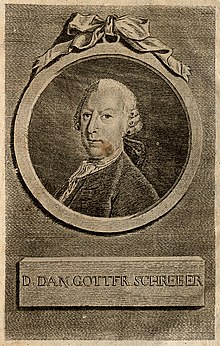Daniel Gottfried Schreber: Difference between revisions
added Category:German jurists using HotCat |
No edit summary |
||
| Line 2: | Line 2: | ||
'''Daniel Gottfried Schreber''' (14 June 1708 – 29 March 1777) was a German [[Cameralism|cameralist]], jurist and natural sciences scholar. |
'''Daniel Gottfried Schreber''' (14 June 1708 – 29 March 1777) was a German [[Cameralism|cameralist]], jurist and natural sciences scholar. |
||
Schreber was born in Schulpforte, [[Naumburg]] and studied law at Leipzig before becoming a cameral science lecturer at the [[Martin Luther University Halle-Wittenberg|University of Halle]] in 1747. He received a honorary doctorate in law from the University of Erlangen. In 1760 he became a professor of philosophy and cameral science at the University of Bützow. In 1764 he became a professor of economics and cameral sciences at the [[Leipzig University|University of Leipzig]]. He served as a commissioner in the House of Saxony-Weißenfels from 1732. |
Schreber was born in Schulpforte, [[Naumburg]] and studied law at Leipzig before becoming a cameral science lecturer at the [[Martin Luther University Halle-Wittenberg|University of Halle]] in 1747. He received a honorary doctorate in law from the University of Erlangen. In 1760 he became a professor of philosophy and cameral science at the University of Bützow. In 1764 he became a professor of economics and cameral sciences at the [[Leipzig University|University of Leipzig]]. He served as a commissioner in the House of Saxony-Weißenfels from 1732. He was an admirer of the Swedish economy and translated a work by [[Anders Berch]].<ref>{{Citation |last=Wennerlind |first=Carl |title=Theatrum Œconomicum: Anders Berch and the Dramatization of the Swedish Improvement Discourse |date=2018 |url=http://link.springer.com/10.1007/978-3-319-58247-4_4 |work=New Perspectives on the History of Political Economy |pages=103–130 |editor-last=Fredona |editor-first=Robert |access-date=2023-10-28 |place=Cham |publisher=Springer International Publishing |language=en |doi=10.1007/978-3-319-58247-4_4 |isbn=978-3-319-58246-7 |editor2-last=Reinert |editor2-first=Sophus A.}}</ref> Schreber was married to Friederike née Grosse and a descendant was [[Daniel Paul Schreber]] who became famous for his first hand account of schizophrenia which was examined by [[Sigmund Freud]] and others.<ref>{{cite book|chapter=Schreber's Father |title=The Schreber Case. Psychoanalytic profile of a paranoid personality| author = Niederland, William G.|year=1984| publisher=Routledge| isbn=9781315799070}}</ref> Daniel Paul Schreber noted that his father's paternal grandfather was Daniel Gottfried Schreber and described him as a biologist and student of Linnaeus and is possibly confused with [[Johann Christian Daniel von Schreber]]. Schreber was merely a correspondent of [[Carl Linnaeus]].<ref>{{Cite web |date=2008-10-27 |title=Daniel Gottfried Schreber to Carl Linnaeus |url=https://linnean-online.org/777773155/#?s=0&cv=0 |access-date=2023-10-28 |website=linnean-online.org |language=en}}</ref> |
||
== References == |
== References == |
||
| Line 14: | Line 14: | ||
[[Category:1708 births]] |
[[Category:1708 births]] |
||
[[Category:1777 deaths]] |
[[Category:1777 deaths]] |
||
[[Category:German jurists]] |
|||
Revision as of 04:54, 28 October 2023

Daniel Gottfried Schreber (14 June 1708 – 29 March 1777) was a German cameralist, jurist and natural sciences scholar.
Schreber was born in Schulpforte, Naumburg and studied law at Leipzig before becoming a cameral science lecturer at the University of Halle in 1747. He received a honorary doctorate in law from the University of Erlangen. In 1760 he became a professor of philosophy and cameral science at the University of Bützow. In 1764 he became a professor of economics and cameral sciences at the University of Leipzig. He served as a commissioner in the House of Saxony-Weißenfels from 1732. He was an admirer of the Swedish economy and translated a work by Anders Berch.[1] Schreber was married to Friederike née Grosse and a descendant was Daniel Paul Schreber who became famous for his first hand account of schizophrenia which was examined by Sigmund Freud and others.[2] Daniel Paul Schreber noted that his father's paternal grandfather was Daniel Gottfried Schreber and described him as a biologist and student of Linnaeus and is possibly confused with Johann Christian Daniel von Schreber. Schreber was merely a correspondent of Carl Linnaeus.[3]
References
- ^ Wennerlind, Carl (2018), Fredona, Robert; Reinert, Sophus A. (eds.), "Theatrum Œconomicum: Anders Berch and the Dramatization of the Swedish Improvement Discourse", New Perspectives on the History of Political Economy, Cham: Springer International Publishing, pp. 103–130, doi:10.1007/978-3-319-58247-4_4, ISBN 978-3-319-58246-7, retrieved 2023-10-28
- ^ Niederland, William G. (1984). "Schreber's Father". The Schreber Case. Psychoanalytic profile of a paranoid personality. Routledge. ISBN 9781315799070.
- ^ "Daniel Gottfried Schreber to Carl Linnaeus". linnean-online.org. 2008-10-27. Retrieved 2023-10-28.
